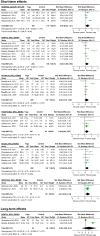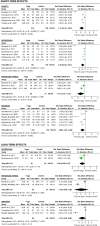Yoga for breast cancer patients and survivors: a systematic review and meta-analysis
- PMID: 22988934
- PMCID: PMC3527138
- DOI: 10.1186/1471-2407-12-412
Yoga for breast cancer patients and survivors: a systematic review and meta-analysis
Abstract
Background: Many breast cancer patients and survivors use yoga to cope with their disease. The aim of this review was to systematically assess and meta-analyze the evidence for effects of yoga on health-related quality of life and psychological health in breast cancer patients and survivors.
Methods: MEDLINE, PsycInfo, EMBASE, CAMBASE, and the Cochrane Library were screened through February 2012. Randomized controlled trials (RCTs) comparing yoga to controls were analyzed when they assessed health-related quality of life or psychological health in breast cancer patients or survivors. Risk of bias was assessed using the Cochrane risk of bias tool. Standardized mean differences (SMD) and 95% confidence intervals (CI) were calculated.
Results: Twelve RCTs with a total of 742 participants were included. Seven RCTs compared yoga to no treatment; 3 RCTs compared yoga to supportive therapy; 1 RCT compared yoga to health education; and 1 RCT compared a combination of physiotherapy and yoga to physiotherapy alone. Evidence was found for short-term effects on global health-related quality of life (SMD = 0.62 [95% CI: 0.04 to 1.21]; P = 0.04), functional (SMD = 0.30 [95% CI: 0.03 to 0.57), social (SMD = 0.29 [95% CI: 0.08 to 0.50]; P < 0.01), and spiritual well-being (SMD = 0.41 [95% CI: 0.08; 0.74]; P = 0.01). These effects were, however, only present in studies with unclear or high risk of selection bias. Short-term effects on psychological health also were found: anxiety (SMD = -1.51 [95% CI: -2.47; -0.55]; P < 0.01), depression (SMD = -1.59 [95% CI: -2.68 to -0.51]; P < 0.01), perceived stress (SMD = -1.14 [95% CI:-2.16; -0.12]; P = 0.03), and psychological distress (SMD = -0.86 [95% CI:-1.50; -0.22]; P < 0.01). Subgroup analyses revealed evidence of efficacy only for yoga during active cancer treatment but not after completion of active treatment.
Conclusions: This systematic review found evidence for short-term effects of yoga in improving psychological health in breast cancer patients. The short-term effects on health-related quality of life could not be clearly distinguished from bias. Yoga can be recommended as an intervention to improve psychological health during breast cancer treatment.
Figures



References
-
- Ferlay J, Shin HR, Bray F, Forman D, Mathers C, Parkin DM. GLOBOCAN 2008 v1.2, Cancer Incidence and Mortality Worldwide: IARC CancerBase No. 10. Lyon, France: International Agency for Research on Cancer; 2010. http://globocan.iarc.fr.
-
- Berry DA, Cronin KA, Plevritis SK, Fryback DG, Clarke L, Zelen M, Mandelblatt JS, Yakovlev AY, Habbema JD, Feuer EJ. Cancer Intervention and Surveillance Modeling Network (CISNET): Collaborators: effect of screening and adjuvant therapy on mortality from breast cancer. N Engl J Med. 2005;353:1784–1792. doi: 10.1056/NEJMoa050518. - DOI - PubMed
-
- Patrick DL, Ferketich SL, Frame PS, Harris JJ, Hendricks CB, Levin B, Link MP, Lustig C, McLaughlin J, Ried LD, Turrisi AT 3rd, Unützer J, Vernon SW. National Institutes of Health State-of-the-Science Panel: National Institutes of Health State-of-the-Science Conference Statement: symptom management in cancer: pain, depression, and fatigue, July 15–17, 2002. J Natl Cancer Inst. 2003;95:1110–1117. - PubMed
Publication types
MeSH terms
LinkOut - more resources
Full Text Sources
Medical

